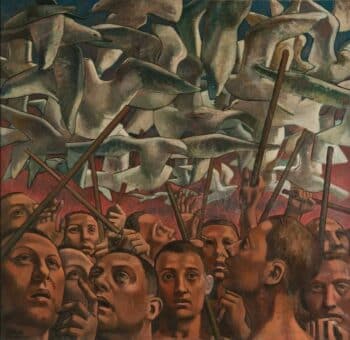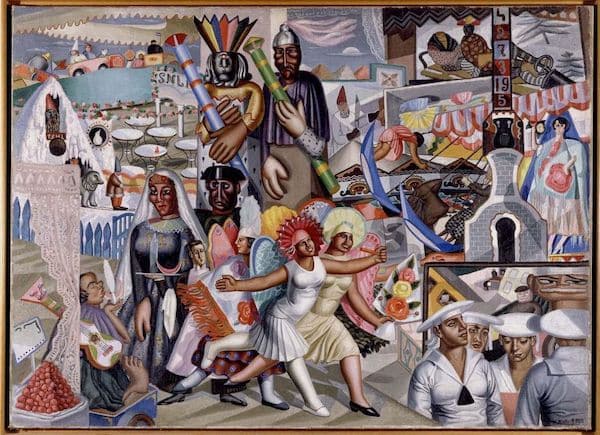Dear friends,
Greetings from the desk of Tricontinental: Institute for Social Research.

Mayo (Egypt), Un soir à Cannes (‘An Evening in Cannes’), 1948.
On 8 January, large crowds of people dressed in colours of the Brazilian flag descended on the country’s capital, Brasília. They invaded federal buildings, including the Congress, Supreme Court, and presidential palace, and vandalised public property. The attack, carried out by supporters of former President Jair Bolsonaro, came as no surprise, since the rioters had been planning ‘weekend demonstrations’ on social media for days. When Luiz Inácio Lula da Silva (known as Lula) was formally sworn in as Brazil’s new president one week prior, on 1 January, there was no such melee; it appears that the vandals were waiting until the city was quiet and Lula was out of town. For all its bluster, the attack was an act of extreme cowardice.
Meanwhile, the defeated Bolsonaro was nowhere near Brasília. He fled Brazil prior to the inauguration—presumably to escape prosecution—and sought haven in Orlando, Florida (in the United States). Even though Bolsonaro was not in Brasília, the Bolsonaristas, as his supporters are known, left their mark throughout the city. Even before Bolsonaro lost the election to Lula this past October, Le Monde Diplomatique Brasil suggested that Brazil was going to experience ‘Bolsonarism without Bolsonaro’. This prediction is supported by the fact that the far-right Liberal Party, which served as Bolsonaro’s political vehicle during his presidency, holds the largest bloc in the country’s Chamber of Deputies and Senate, while the toxic influence of the right wing persists both in Brazil’s elected bodies and political climate, especially on social media.
The two men responsible for public safety in Brasília—Anderson Torres (the secretary of public security of the Federal District) and Ibaneis Rocha (the governor of the Federal District)—are close to Bolsonaro. Torres served as the minister of justice and public security in Bolsonaro’s government, while Rocha formally supported Bolsonaro during the election. As the Bolsonaristas prepared their assault on the capital, both men appeared to have abdicated their responsibilities: Torres was on holiday in Orlando, while Rocha took the afternoon off on the last working day before the coup attempt. For this complicity in the violence, Torres has been dismissed from his post and faces charges, and Rocha has been suspended. The federal government has taken charge of security and arrested over a thousand of these ‘fanatic Nazis’, as Lula called them. There is a good case to be made that these ‘fanatic Nazis’ do not deserve amnesty.

Kartick Chandra Pyne (India), Workers, 1965.
The slogans and signs that pervaded Brasília on 8 January were less about Bolsonaro and more about the rioters’ hatred for Lula and the potential of his pro-people government. This sentiment is shared by big business sectors—mainly agribusiness—which are furious about the reforms proposed by Lula. The attack was partly the result of the built-up frustration felt by people who have been led, by intentional misinformation campaigns and the use of the judicial system to unseat the Lula’s party, the Workers’ Party (PT), through ‘lawfare’, to believe that Lula is a criminal—even though the courts have ruled this to be false. It was also a warning from Brazil’s elites. The unruly nature of the attack on Brasília resembles the 6 January 2021 attack on the U.S. Capitol by supporters of former U.S. President Donald Trump. In both cases, far-right illusions, whether about the dangers of the ‘socialism’ of U.S. President Joe Biden or the ‘communism’ of Lula, symbolise the hostile opposition of the elites to even the mildest rollback of neoliberal austerity.
The attacks on government offices in the United States (2021) and Brazil (2023), as well as the recent coup in Peru (2022), are not random events; beneath them is a pattern that requires examination. At Tricontinental: Institute for Social Research, we have been engaged in this study since our founding five years ago. In our first publication, In the Ruins of the Present (March 2018), we offered a preliminary analysis of this pattern, which I will develop further below.

Leonora Carrington (Mexico), Figuras fantásticas a caballo (‘Fantastical Figures on Horseback’), 2011.
After the Soviet Union collapsed in 1991 and the Third World Project withered as a result of the debt crisis, the U.S.-driven agenda of neoliberal globalisation prevailed. This programme was characterised by the state’s withdrawal from the regulation of capital and by the erosion of social welfare policies. The neoliberal framework had two major consequences: first, a rapid increase in social inequality, with the growth of billionaires at one pole and the growth of poverty at the other, along with an exacerbation of inequality along North-South lines; and second, the consolidation of a ‘centrist’ political force that pretended that history, and therefore politics, had ended, leaving only administration (which in Brazil is well-named as centrão, or the ‘centre’) remaining. Most countries around the world fell victim to both the neoliberal austerity agenda and this ‘end of politics’ ideology, which became increasingly anti-democratic, making the case for technocrats to be in charge. However, these austerity policies, cutting close to the bone of humanity, created their own new politics on the streets, a trend that was foreshadowed by the IMF riots and bread riots of the 1980s and later coalesced into the ‘anti-globalisation’ protests. The U.S.-driven globalisation agenda produced new contradictions that belied the argument that politics had ended.

Roberto Matta (Chile), Invasion of the Night, 1942.
The Great Recession that set in with the global financial crisis of 2007—08 increasingly invalidated the political credentials of the ‘centrists’ who had managed the austerity regime. The World Inequality Report 2022 is an indictment of neoliberalism’s legacy. Today, wealth inequality is as bad as it was in the early years of the twentieth century: on average, the poorest half of the world’s population owns just $4,100 per adult (in purchasing power parity), while the richest 10 percent owns $771,300—roughly 190 times as much wealth. Income inequality is equally harsh, with the richest 10 percent absorbing 52 percent of world income, leaving the poorest 50 percent with merely 8.5 percent of world income. It gets worse if you look at the ultra-rich. Between 1995 and 2021, the wealth of the top one percent grew astronomically, capturing 38 percent of global wealth while the bottom 50 percent only ‘captured a frightening two percent’, the authors of the report write. During the same period, the share of global wealth owned by the top 0.1 percent rose from 7 percent to 11 percent. This obscene wealth—largely untaxed—provides this tiny fraction of the world’s population with a disproportionate amount of power over political life and information and increasingly squeezes the ability of the poor to survive.
The World Bank’s Global Economic Prospects report (January 2023) forecasts that, at the end of 2024, gross domestic product (GDP) in 92 of the world’s poorer countries will be 6 percent below the level expected on the eve of the pandemic. Between 2020 and 2024, these countries are projected to suffer a cumulative loss in GDP equal to roughly 30 percent of their 2019 GDP. As central banks in the richest countries tighten their monetary policies, capital for investment in the poorer nations is drying up and the cost of debts already held has increased. Total debt in these poorer countries, the World Bank notes, ‘is at a 50-year high’. Roughly one in five of these countries are ‘effectively locked out of global debt markets’, up from one in fifteen in 2019. All of these countries—excluding China—‘suffered an especially sharp investment contraction of more than 8 percent’ during the pandemic, ‘a deeper decline than in 2009’, in the throes of the Great Recession. The report estimates that aggregate investment in these countries will be 8 percent lower in 2024 than had been expected in 2020. Faced with this reality, the World Bank offers the following prognosis: ‘Sluggish investment weakens the rate of growth of potential output, reducing the capacity of economies to increase median incomes, promote shared prosperity, and repay debts’. In other words, the poorer nations will slide deeper into a debt crisis and into a permanent condition of social distress.

Ivan Sagita (Indonesia), A Dish for Life, 2014.
The World Bank has sounded the alarm, but the forces of ‘centrism’—beholden to the billionaire class and the politics of austerity—simply refuse to pivot away from the neoliberal catastrophe. If a leader of the centre-left or left tries to wrench their country out of persistent social inequality and polarised wealth distribution, they face the wrath of not merely the ‘centrists’, but the wealthy bondholders in the North, the International Monetary Fund, and the Western states. When Pedro Castillo won the presidency in Peru in July 2021, he was not permitted to pursue even a Scandinavian form of social democracy; the coup machinations against him began before he was inaugurated. The civilised politics that would end hunger and illiteracy are simply not permitted by the billionaire class, who spend vast amounts of money on think tanks and media to undermine any project of decency and fund the dangerous forces of the far right, who shift the blame for social chaos away from the tax-free ultra-rich and the capitalist system and onto the poor and marginalised.
The hallucinatory insurrection in Brasília emerged from the same dynamic that produced the coup in Peru: a process in which ‘centrist’ political forces are funded and brought to power in the Global South to ensure that their own citizens remain at the rear of the queue, while the wealthy tax-free bondholders of the Global North remain at the front.
On the barricades of Paris on 14 October 1793, Pierre Gaspard Chaumette, the president of the Paris Commune who himself fell to the guillotine to which he sent many others, quoted these fine words from Jean-Jacques Rousseau: ‘When the people shall have nothing more to eat, they will eat the rich’.
Warmly,
Vijay

